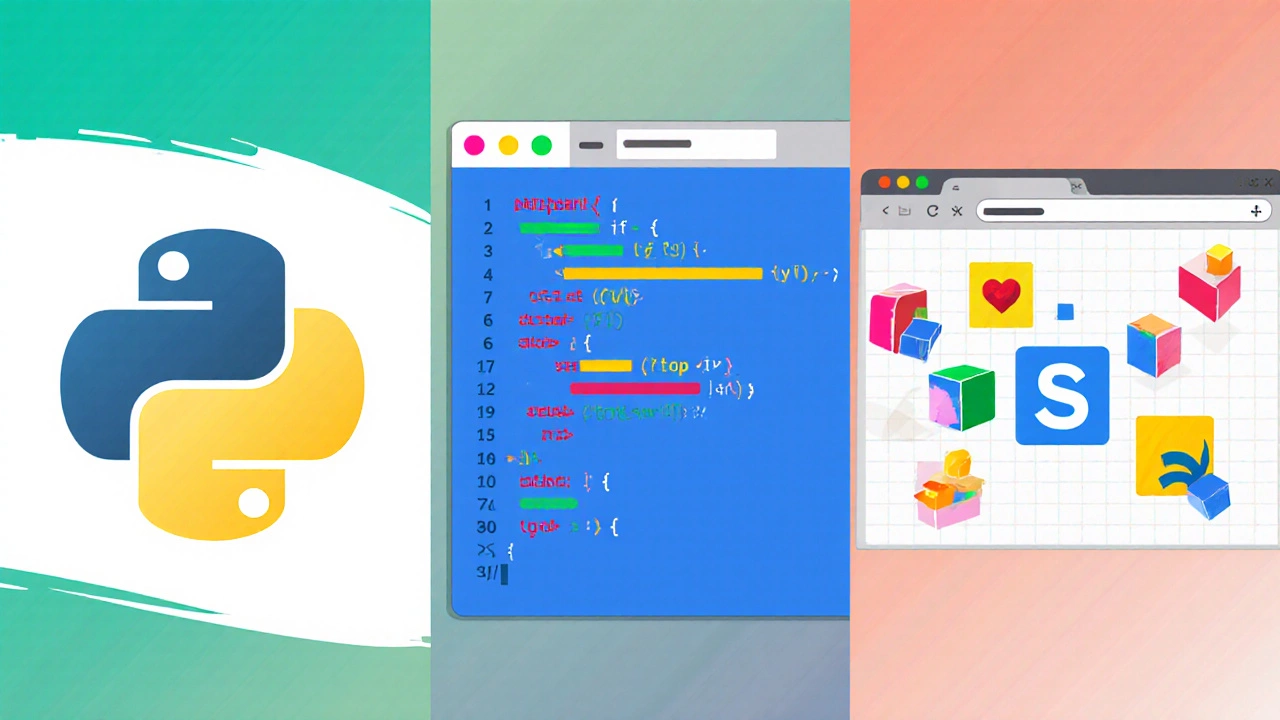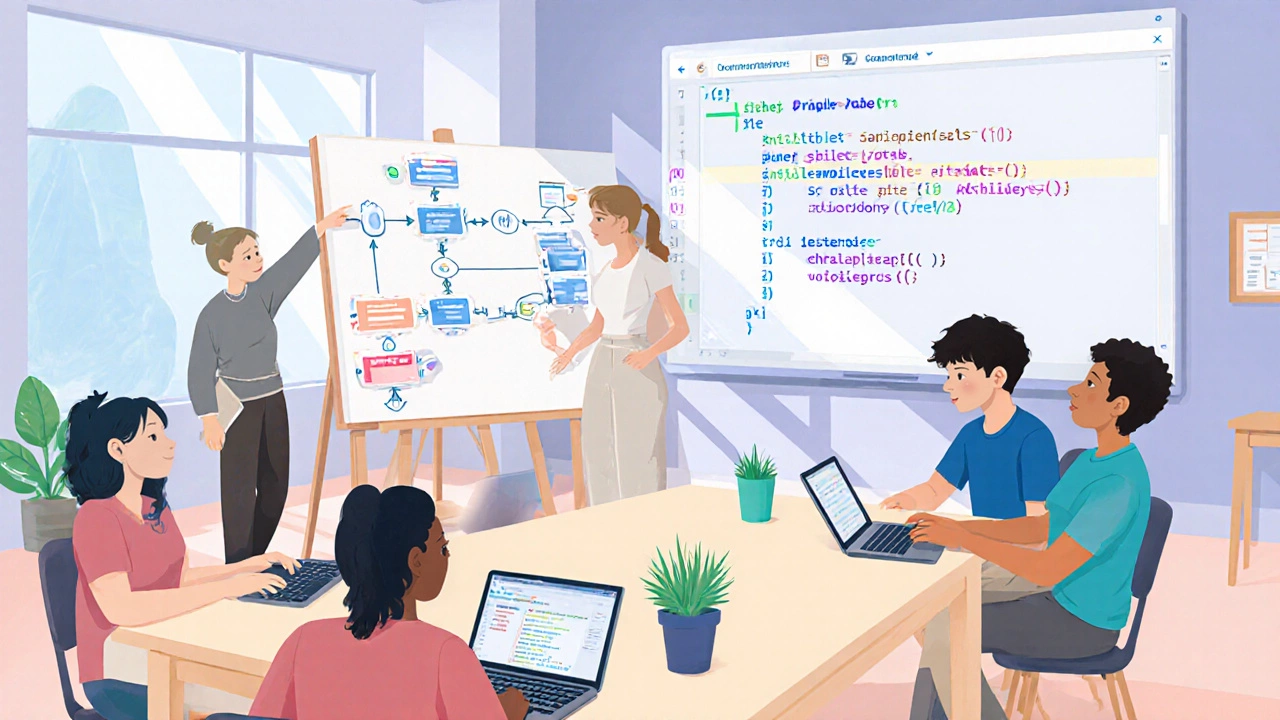
Coding Language Match Calculator
Find Your Perfect Coding Start
Answer these 3 questions to get personalized language recommendations based on your interests and math comfort level.
Your Personalized Coding Recommendation
Python
Low math requiredWhy this language? Python uses simple syntax that reads like plain English. Perfect for beginners because it focuses on problem-solving rather than complex math concepts.
Ever stared at a line of code and wondered if a lack of math will hold you back? You’re not alone. Many aspiring developers believe that heavy equations are a gate‑keeper to programming, but the truth is far more encouraging. learn to code is absolutely possible even if math feels like a weak spot.
Why Math Isn’t the Main Barrier
Often the myth starts in school: math is presented as a series of formulas, and programming is described as “algorithmic math.” In reality, most everyday coding tasks rely more on logical flow and clear thinking than on calculus or linear algebra. While some specialties-like graphics programming, machine learning, or scientific computing-do demand advanced math, the majority of web, mobile, and business applications use coding the practice of writing instructions for computers to perform specific tasks that anyone can master.
Core Skills You Need (And How They Differ From Math)
The skills that overlap with math are Algorithmic thinking breaking problems into step‑by‑step procedures and Logic using true/false conditions to guide program flow. Both are teachable without diving into equations. Think of it as a puzzle: you arrange pieces (variables, loops, conditionals) until the picture makes sense.
If you’re comfortable with everyday reasoning-like following a recipe or troubleshooting a broken gadget-you already possess the foundation for Problem solving identifying issues and iterating toward a solution. The difference is that in code you express that process in a language a computer can understand.
Beginner‑Friendly Languages That Don’t Need Heavy Math
Choosing the right language can make the math‑free journey smoother. Below is a quick comparison:
| Language | Math Intensity | Typical Use Cases | Beginner Friendliness |
|---|---|---|---|
| Python | Low | Web apps, automation, data cleaning | Very high - clear syntax, huge community |
| JavaScript | Low | Web front‑end, interactive UI, Node.js back‑end | High - runs in browser, instant feedback |
| Scratch | None | Introductory projects, animations, games | Extremely high - visual blocks, no typing needed |
| Ruby | Low | Web apps (Rails), scripting | High - reads like English |
Notice that none of these languages require you to solve differential equations. They focus on expressing logic, handling data, and creating user interactions.
Here’s a brief look at each:
- Python a high‑level language praised for its readability lets you write “if‑else” statements in just a few words. It’s the go‑to starter language for bootcamps and university courses.
- JavaScript the scripting language of the web, executed directly in browsers offers instant visual results-perfect for keeping motivation high.
- Scratch a block‑based visual programming environment from MIT removes the syntax barrier entirely and teaches flow control through drag‑and‑drop.

Learning Pathways That Work When Math Isn’t Your Strength
Structured learning helps you stay focused and build confidence. Below are three proven routes:
- Online self‑paced courses: Platforms like Coursera, Udemy, and freeCodeCamp organize content into bite‑size modules. Look for titles that mention “no prior math required.”
- Local coding classes: Many community centres in Melbourne run beginner workshops that emphasize visual programming before moving to text‑based code.
- Bootcamps with a logic‑first approach: Some bootcamps (e.g., online coding bootcamps intensive short‑term programs focusing on real‑world projects) start with flowcharts and pseudocode, sidestepping any heavy math until you’re comfortable.
Whichever path you pick, keep these habits in mind:
- Write code every day, even if it’s just a single line.
- Pair program with a friend who can ask “why” instead of “what” - this pushes logical reasoning.
- Use visual tools (flowcharts, mind maps) to map out program flow before typing.
Practical Tips to Overcome Math Anxiety in Coding
Math anxiety can spill over into programming, but you can neutralize it with concrete actions:
- Focus on variables, not equations: Treat a variable like a labeled box that holds a value. You don’t need to know the algebra behind it.
- Master conditionals first: “if (score > 90) { … }” reads like plain English. Practice converting everyday decisions into code.
- Play logic games: Sudoku, chess puzzles, or the “Tower of Hanoi” sharpen the same mental muscles used in loops and recursion.
- Leverage visual debugging: Tools like Chrome DevTools let you watch variable values change in real time, turning abstract numbers into tangible visuals.
- Start with block‑based prototypes: Build a simple game in Scratch, then translate the same logic to Python or JavaScript.

Real‑World Stories: Successful Developers Who Were Not Math Wizards
Seeing real examples can crush doubt. Here are three brief stories:
- John Resig, creator of jQuery, once admitted he struggled with high‑school algebra but built one of the most widely used JavaScript libraries by focusing on readability and reusable patterns.
- Tracy Chou, a prominent engineer at Pinterest, credits her early work on HTML/CSS (which involve no math) for landing her first dev job.
- Mark Zuckerberg famously said he learned programming by building simple websites before ever taking a college math class.
All three leveraged logical thinking, curiosity, and consistent practice-none of which required advanced math.
Frequently Asked Questions
Do I need to know calculus to become a web developer?
No. Front‑end and back‑end web development rely on HTML, CSS, JavaScript, and server‑side languages. None of these require calculus; they depend on understanding how to manipulate data and control flow.
What’s the easiest programming language for someone who hates math?
Python tops most lists because its syntax reads like plain English and most tutorials avoid heavy math. Scratch is even easier if you prefer drag‑and‑drop blocks.
How long does it take to become job‑ready if I’m not good at math?
With focused study - about 10‑15 hours per week - you can reach a junior‑level competency in 4‑6 months. Many bootcamps design curricula around logical thinking rather than advanced math.
Can I switch to data‑science later if I start without math?
Yes, but data‑science eventually requires statistics and linear algebra. Starting with programming gives you a solid base; you can add math courses gradually as your career evolves.
Are there any certifications that don’t test math?
Most entry‑level certs - like the Microsoft Azure Fundamentals or Google Associate Cloud Engineer - focus on cloud concepts, command‑line basics, and scripting, with minimal math.
Bottom line: coding is a skill you can nurture with practice, curiosity, and logical reasoning. Math helps in certain niches, but it’s not a gatekeeper for most development roles. Pick a friendly language, follow a structured learning path, and start building tiny projects today. Your future as a developer is just a few lines of code away.
